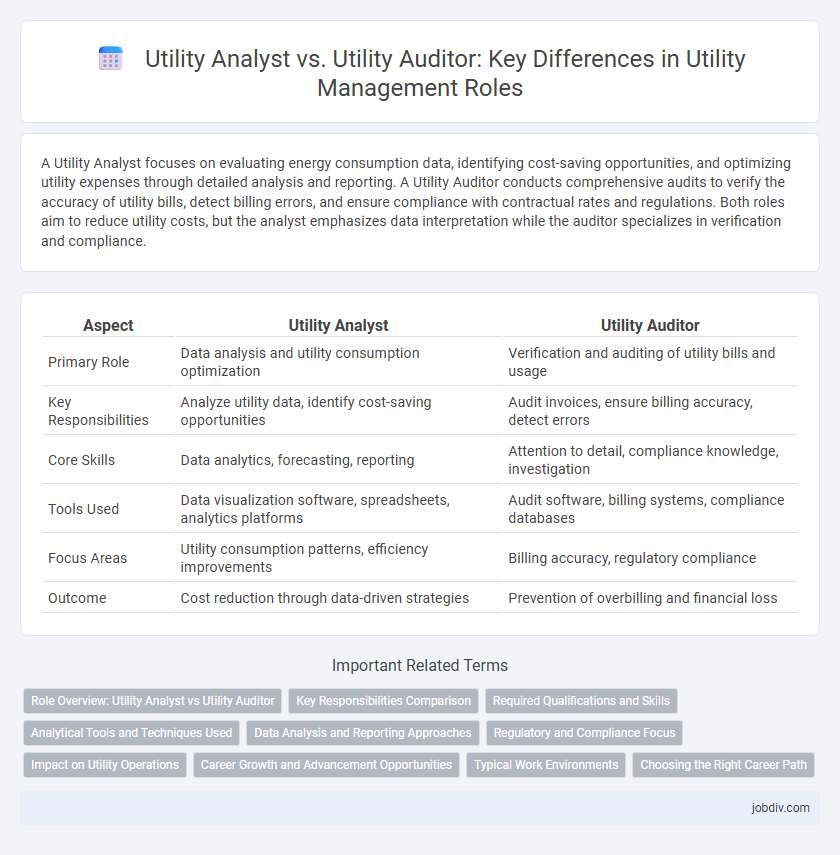A Utility Analyst focuses on evaluating energy consumption data, identifying cost-saving opportunities, and optimizing utility expenses through detailed analysis and reporting. A Utility Auditor conducts comprehensive audits to verify the accuracy of utility bills, detect billing errors, and ensure compliance with contractual rates and regulations. Both roles aim to reduce utility costs, but the analyst emphasizes data interpretation while the auditor specializes in verification and compliance.
Table of Comparison
| Aspect | Utility Analyst | Utility Auditor |
|---|---|---|
| Primary Role | Data analysis and utility consumption optimization | Verification and auditing of utility bills and usage |
| Key Responsibilities | Analyze utility data, identify cost-saving opportunities | Audit invoices, ensure billing accuracy, detect errors |
| Core Skills | Data analytics, forecasting, reporting | Attention to detail, compliance knowledge, investigation |
| Tools Used | Data visualization software, spreadsheets, analytics platforms | Audit software, billing systems, compliance databases |
| Focus Areas | Utility consumption patterns, efficiency improvements | Billing accuracy, regulatory compliance |
| Outcome | Cost reduction through data-driven strategies | Prevention of overbilling and financial loss |
Role Overview: Utility Analyst vs Utility Auditor
A Utility Analyst evaluates energy usage data and financial metrics to optimize utility consumption and reduce costs, using data analytics and forecasting models. A Utility Auditor examines utility bills and contractual agreements to identify billing errors, ensure regulatory compliance, and verify accurate charges through detailed audits. Both roles contribute to utility cost management, with Analysts focusing on data-driven strategy and Auditors emphasizing accuracy and compliance.
Key Responsibilities Comparison
Utility Analysts focus on analyzing utility data, forecasting usage trends, and optimizing energy consumption to reduce costs and improve efficiency. Utility Auditors primarily conduct detailed reviews of utility bills, verify charges against contracts and regulatory standards, and identify discrepancies or overcharges for recovery. Both roles contribute to effective utility management but differ in their core functions: analysis and optimization versus verification and compliance.
Required Qualifications and Skills
Utility Analysts require strong analytical skills, proficiency in data modeling, and a deep understanding of energy markets and consumption patterns to optimize utility costs. Utility Auditors need expertise in regulatory compliance, auditing standards, and financial analysis to accurately assess utility bills and detect discrepancies. Both roles demand attention to detail, knowledge of utility rate structures, and experience with specialized software for utility management.
Analytical Tools and Techniques Used
Utility Analysts leverage advanced data analytics software such as SAS, Tableau, and Python to perform predictive modeling, trend analysis, and demand forecasting, enabling efficient resource management. Utility Auditors utilize specialized audit management tools like ACL and IDEA for data extraction, fraud detection, and compliance verification, ensuring accuracy and regulatory adherence in financial records. Both roles employ statistical methods and database querying languages like SQL to interpret vast datasets, but their toolsets are tailored to operational analysis versus financial and regulatory auditing.
Data Analysis and Reporting Approaches
Utility Analysts employ advanced data modeling and predictive analytics to optimize energy consumption patterns and identify cost-saving opportunities. Utility Auditors focus on verifying financial and operational data accuracy, ensuring regulatory compliance through meticulous examination of utility bills and usage reports. Both roles utilize detailed reporting tools, but Analysts emphasize trend forecasting while Auditors prioritize data validation and error detection.
Regulatory and Compliance Focus
Utility Analysts primarily concentrate on analyzing data to ensure compliance with regulatory requirements and optimize operational efficiency within utility companies. Utility Auditors focus on verifying adherence to regulatory standards through comprehensive audits, identifying discrepancies, and ensuring accurate reporting to regulatory bodies. Both roles are critical in maintaining regulatory compliance, but Utility Auditors emphasize verification and control, whereas Utility Analysts drive insights and compliance strategy through data analysis.
Impact on Utility Operations
Utility Analysts optimize operational efficiency by analyzing consumption data, forecasting demand, and identifying cost-saving opportunities, directly enhancing utility resource management. Utility Auditors, on the other hand, ensure regulatory compliance and financial accuracy through detailed audits of billing practices and contract adherence, protecting the utility from financial risks and legal issues. Both roles significantly impact utility operations by driving data-informed decisions and maintaining operational integrity, contributing to sustainable utility management.
Career Growth and Advancement Opportunities
Utility Analysts concentrate on data interpretation and operational efficiency, often advancing into senior analyst or management roles by developing expertise in utility market trends and regulatory compliance. Utility Auditors focus on financial accuracy and regulatory adherence, with career growth typically leading to audit manager positions or specialized roles in risk management and internal controls. Both roles offer strong advancement potential within utility companies, driven by the increasing complexity of energy markets and the demand for regulatory compliance.
Typical Work Environments
Utility Analysts typically work in corporate offices of energy providers, regulatory agencies, or consulting firms, analyzing data and forecasting utility usage patterns using advanced software tools. Utility Auditors are often found in field locations, customer sites, or utility companies' headquarters, conducting on-site inspections and verifying billing accuracy to ensure compliance with regulatory standards. Both roles require collaboration with cross-functional teams but differ in their proximity to operational environments versus analytical settings.
Choosing the Right Career Path
Utility analysts specialize in data evaluation to optimize energy consumption and cost efficiency, offering strategic insights for utility companies. Utility auditors focus on verifying compliance, identifying billing errors, and ensuring accurate financial reporting within utility operations. Choosing the right career path depends on preference for analytical strategy development versus regulatory compliance and financial accuracy in the utility sector.
Utility Analyst vs Utility Auditor Infographic

 jobdiv.com
jobdiv.com